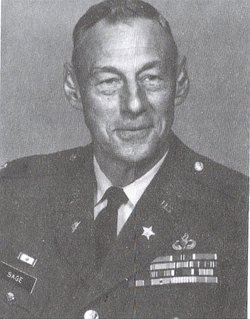Colonel Jerry M. Sage entered the Army in 1938 through the Reserve Officers Training
Corps at the State College of Washington, where he had been a distinguished varsity
football player and earned Phi Beta Kappa academic honors.
He came on active duty on December 9, 1941 as an infantry officer and was recruited
into the Office of Strategic Services on July 1, 1942. During his training with the
British Special Operations Executive he earned the nickname “Dagger”, due to his
expertise in knife fighting, which became his code name. He subsequently trained
colleagues at the Office of Strategic Services in Maryland until January 1943.
Major Sage deployed with his Experimental Detachment 3, a 20-person combined
team that was the precursor of the later Office of Strategic Services Operational
Group, to North Africa.
Conducting interdiction operations behind German lines, he was wounded and
captured, while recovering a teammate. He spent the bulk of World War II in various
prison camps where he became notable for his more than 15 escape attempts, earning
the moniker “Cooler King”, for his recapture punishment. His escape exploits at Stalag
Luft III became the basis for the Steve McQueen character in “The Great Escape”.
After he made his successful final escape in March 1945, he resumed his service with
the Office of Strategic Services in Poland and other locations in the European Theater
of Operations. Post-war he coordinated repatriation of displaced persons based upon
his language skills developed during captivity.
At the height of the Cold War, his leadership and infantry command experience in
Korea with the 5th Regimental Combat Team earned him selection to command the
10th Special Forces Group (Airborne) in Bad Tolz, Germany, from August 1963–
September 1965.
In the later part of his career, Col. Sage served in the Pentagon in two Special Forces
related assignments: first on the Army Staff developing the unconventional warfare
training requirements for the U.S. Army Special Forces; and then within the Office
of the Joint Chiefs of Staff developing strategic plans for employment of special
operations. During that assignment, he was a member of the team that conducted a
strategic assessment of the situation in Southeast Asia and Vietnam.
Col. Sage’s significant awards and decorations include the Legion of Merit with oak
leaf cluster, Prisoner of War Medal, Purple Heart, Bronze Star Medal, Order of the
British Empire, Master Parachutist Badge, World War II Victory Medal, Korean
Service Medal, United Nations Service Medal, American and European-African-
Middle East Campaign Medals and eight overseas bars.
Col. Sage’s service to the Regiment continued after his 1982 retirement, as an
educator and mentor of youth at both the college and high school levels. While serving
as Assistant to the President, he developed a course on civics for the University of
South Carolina.
His outstanding instructor and leadership skills later earned him High School Teacher
of the Year for the state of South Carolina in 1978. He served in numerous community
activities, including the establishment of a Civitan Club in Enterprise, Alabama, to
aid needy and handicapped persons, earning national recognition for his efforts.
Col. Sage passed away in 1993 and was interned in Enterprise. One of his sons was a
graduate of West Point and was killed while serving in Vietnam.
Source: śwcs.mil

PRIVATE CITIZENS SUPPORTING AMERICA'S HERITAGE
American
War Memorials Overseas, Inc.
War Memorials Overseas, Inc.
Sage Jerome M. 'Jerry'
Name:
Jerome M. 'Jerry' Sage
Rank:
Colonel
Serial Number:
Unit:
OSS
Date of Death:
1993-03-26
State:
South Carolina
Cemetery:
Meadowlawn Cemetery Enterprise, Coffee County, Alabama
Plot:
Row:
Grave:
Decoration:
Legion of Merit; POW Medal
Comments:
